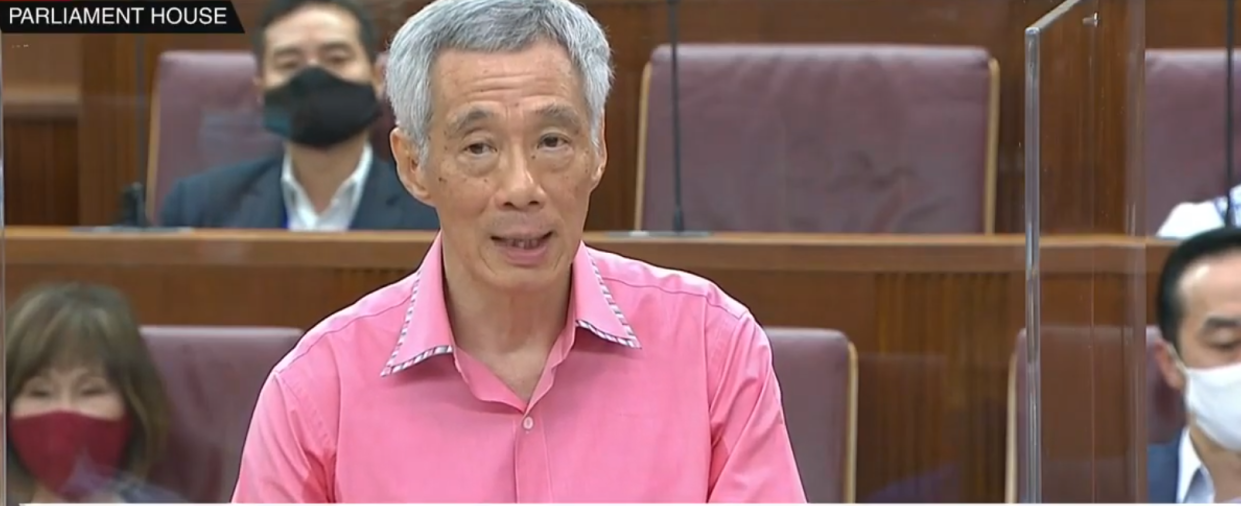Singapore's COVID-19 response 'not without shortcomings', would have done some things differently in hindsight: PM Lee Hsien Loong

SINGAPORE — In hindsight, the government would have handled issues such as the quarantine of returning Singaporeans and the migrant worker dormitories differently, Prime Minister Lee Hsien Loong acknowledged on Tuesday (1 September).
“All this is wisdom after the fact. We must learn from these errors, and do better the next time. But in the fog of war, it’s not possible always to make the perfect decisions,” said Lee, who was delivering a parliamentary speech in lieu of the annual National Day Rally (NDR). The NDR is widely considered the most important political speech of the year.
“The key is to watch things closely, learn from experience, and adapt our responses promptly as new information emerges and the situation changes.”
For example, if authorities had known earlier that people with COVID-19 were infectious even when asymptomatic, all Singaporeans returning in March would have been quarantined, instead of only those returning from certain countries. “And we would have tested all of them before releasing them from quarantine, whether or not they showed any symptoms, instead of assuming that no symptoms meant no infection.”
Lee added, “We would also have recommended that everyone wear face masks sooner than we did. But at the time, we took the best available scientific advice.”
Migrant worker dorms
The Prime Minister also addressed the most controversial aspect of the government’s pandemic response: the management of the migrant worker dormitories, where tens of thousands of workers have been infected and many remain confined.
“We would also have acted more aggressively and sooner on the migrant worker dormitories. We knew that communal living in the dorms posed an infection risk,” said Lee, who admitted that the viral outbreak in the dorms “threatened to overwhelm us”.
Because of the scale and complexity of operations, said Lee, there have inevitably been some “rough edges”. For example, with many of the dorms cleared of the virus, migrant workers have been resuming work, especially in the construction industry. But the risk of cases re-emerging makes this a “complicated exercise”, which is “difficult and burdensome” for employers, said the 68-year-old.
“They have found it frustrating to deal with all the new rules, approvals and inspections, even as they try to get their businesses up and running again. But I hope they understand that we are doing our best to smooth things out for them, and are doing all this in order to keep our people safe.”
Praise for the public service
Lee said the country’s pandemic response was enabled by the public service, the political leadership, businesses, and the public working closely together, each doing their part.
“The officials, ministries and agencies have worked tirelessly, building new capabilities on the fly, and stepping up to do things way beyond their normal scale or scope,” said the PM, who praised the “high-quality, dedicated, and adaptable” public service.
He noted that the political leadership had also taken tough decisions, such as whether to impose a circuit breaker and what activities to restrict, and took responsibility for explaining them to the public.
Businesses came forward to do “sterling national service”, said Lee, putting their people to work furiously on solutions, and setting up mask production lines, constructing Community Care Facilities and building up testing capacity, among others.
Ordinary Singaporeans also gave the government their trust and support, complying with “tough and painful measures”, and volunteering to take part in COVID-19 operations, said Lee. “Many Singaporeans’ lives have been severely affected, but they have borne these difficulties calmly and stoically.
“I am very grateful for their cooperation and trust. Their support will remain crucial as we continue the fight to keep Singaporeans safe.”
Stay in the know on-the-go: Join Yahoo Singapore's Telegram channel at http://t.me/YahooSingapore
Related stories:
49 new COVID-19 cases brings Singapore's tally to 56,901
Tearful Josephine Teo says government stands by workers amid COVID-19-led downturn
At breaking point: Singapore's migrant workers struggle with isolation, anxiety amid COVID-19 curbs



